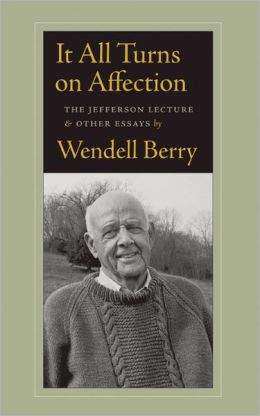Called by its sponsor, the National Endowment for the Humanities, “the highest honor the federal government bestows for distinguished intellectual and public achievement in the humanities,” the annual Jefferson Lecture has been delivered by such a variety of historians, scholars, novelists, and poets as to frustrate all efforts to descry a party line among them, although individual lecturers have been famously partisan (e.g., Toni Morrison, Arthur Miller, Henry Louis Gates, Jr.).
Last year’s lecturer was the poet, novelist, cultural critic, and farmer Wendell Berry. Those Chronicles readers who are acquainted with him and his work will not be surprised that “It All Turns on Affection” is concerned with family farming. At least since the publication of The Unsettling of America (1977), Berry has been the foremost exponent of farming as a way of living that sustains a man, his wife, and their children, a way of living that roots a family to a particular place for generation upon generation, a way of living essential to the thriving of small communities—indeed, of all communities. Berry’s fiction and poetry depict that way of living, and because they draw on his own family history they do so historically, culturally, and intimately. His nonfiction is primarily advocacy and defense of that way of living. The Jefferson Lecture is an example of that strain in Berry’s work.
It begins with an anecdote from 1906, when Berry’s grandparents discussed how to spend the profit on their tobacco crop as their six-year-old, Berry’s father, listened. But there was no profit, thanks to James B. Duke, “who, disregarding any other consideration, followed a capitalist logic to absolute control of his industry and, incidentally, of the economic fate of thousands of families such as [Berry’s] own.” Invoking, as he often does, a line, a phrase, or, in this case, an antimony from a writer he admires, Berry adds that Duke exemplifies one of the two kinds of people that Americans are “by inclination,” according to Wallace Stegner, the novelist of the West who was Berry’s teacher and mentor.
In Stegner’s terms, Duke was a “boomer”—“motivated by greed, the desire for money, property, and therefore power. . . . He went, or sent, wherever the getting was good, and he got as much as he could take.” (I can’t help recalling the words an oil executive once attributed to his boss, Charles Koch: “I want my fair share, and that’s all of it.”) Grandfather Berry was what Stegner called a “sticker”—“motivated by affection, by such love for a place and its life that [he wanted] to preserve it and remain in it.” As Berry expands on Stegner’s polarity, boomers are associated with corporate industrialism; stickers, with “what Aldo Leopold called ‘the land-community.’” The balance of the lecture works out the opposition through personal and familial memories, the industrializing history of 20th-century agriculture, and the humanizing realizations of thinkers and artists including John Lukacs, Allen Tate, and finally E.M. Forster, whose novel about an inheritance of land, Howard’s End, furnishes the talk’s title.
It is all vintage Wendell Berry, a polemic that is definite and determined about the ills it decries but decent, literate, and fair in its attack because it strives to speak out of that in which it purports to be based: affection. It does not argue hopelessly but recognizes positive developments, among them current efforts to revive the local, personal economies of cities and their rural surroundings. Berry does not think simplistically about permanent change for the better: “No doubt there always will be some people willing to do anything at all that is financially or technically possible,” and many “stickers,” being human, act self-destructively. His argument is not utopian; farming is not for everyone, and Berry resolutely limits his visionary impulses to the local, citing Wallace Stevens: “Imagination applied to the whole world is vapid in comparison to imagination applied to a detail.”
In addition to the Jefferson Lecture, this book contains a pre-lecture conversation between Berry and Jim Leach (the former Iowa congressman, now chairman of the NEH), to which Berry’s wife, Tanya, and the journalist David Skinner contribute; four essays, two of them memorializing departed friends and colleagues; and a short speech.
That speech, “The Future of Agriculture,” addresses the same basic problem that the lecture confronts—the face-off between farming and industrialism—and includes a seven-point agenda for “ordinary citizens,” the opening sentence of which establishes the tenor: “First, we must not work or think on a heroic scale.” The eulogies recall Harry Caudill (1922-90), the lawyer and author of Night Comes to the Cumberlands (1962), who fought for the environmental integrity of Appalachia against the coal-mining industry, and Maury Telleen (1928-2011), long the editor of The Draft Horse Journal, who introduced Berry to Amish farmers in Iowa and was, Berry says, the nonwriting coauthor of The Unsettling of America. “Starting From Loss” was written to introduce the anthology Kentucky’s Natural History (2010); it concludes with a list of ten reasons for hope for conservationists concerned with agriculture.
In the next-to-shortest entry, “About Civil Disobedience,” Berry reveals that he has committed the specified offense thrice, always to protest environmental outrages. He stresses that he argues for civil disobedience only if it is nonviolent, owing to “the commandment to love our neighbors, even if they are our enemies,” and because meeting violence with violence is nonsensical. And no, he does not want to go to jail, as “some genius with a microphone” once asked him. Further, he does not expect victory over the coal industry through civil disobedience, or any other tactic, any time soon, though he is cheered to see how many people have rallied to stop mountaintop removal. Berry credits lawyer Courtney Wells of Hazard, Kentucky, with giving him a permanently sufficient reason for opposing Big Coal: “I want to be on the side of the right.”

Leave a Reply